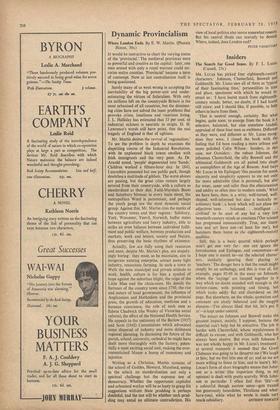Insiders
The Search for Good Sense. By F. L. Lucas. (Cassell, 25s.)
MR. LUCAS has picked four eighteenth-centurY characters : Johnson, Chesterfield, Boswell and Goldsmith. Mr. Lucas sees all of them as 'typical of their fascinating time,' personalities in time and place, specimens with which he would in- struct us : 'I have learnt much from eighteenth- century minds; better, no doubt, if I had learnt still more; and I should like, if possible, to help others to learn from them.'
That is neutral enough, certainly. But what begins, quite soon, to emerge from the book is a selective, balanced, but also somehow loaded, appraisal of these four men as emblems. Different as they were, and different as Mr. Lucas recog- nises they were, I closed the book with the feeling that I'd been reading a more urbane and more polished Colin Wilson : Insiders, in this case, not Outsiders : the robust Johnson, the inhuman Chesterfield, the silly Boswell and the whimsical Goldsmith are all patted into shape as exemplifiers of the Age of Reason. And (says Mr. Lucas in his Epilogue) 'this passion for sense, sincerity and simplicity appears to me not only far more admirable (that is personal), but also far wiser, saner and safer than the obscurantism and oddity so often dear to modern minds.' What we have here, then, is a witty, well-turned, well- shaped, well-informed but also a basically re- actionary book : a book which will not allow the adjectives 'sane . . . balanced . . . intelligent . . • civilised' to be used of any but a very feW twentieth-century minds or creations ('Our science has progressed immeasurably. True, our litera- ture and art have not—at least for me'), but hammers them home as the eighteenth-century qualities.
. Still, this is a basic quarrel which perhaps won't get one very far : one can ignore the Introduction and Epilogue, and, concentrate—as I hope one is meant to—on the selected charac- ters. similarly ignoring their placing as 'teachers.' The danger here is that the result might simply be an anthology, and this is true of, for example, pages 93-99 in the essay on Johnson, where the 'sayings' are lumped together in a way which no doubt sounded well enough in the lecture-room, with pointing and timing, but which looks oddly flat and disordered on the page. But elsewhere, on the whole, quotation and comment are nicely balanced and the magpie element—'I've always liked that bit, let's put it in'—is kept under control.
The essays on Johnson and Boswell make the greatest impact, mainly, I suppose, because the material can't help but be attractive. The job is harder with Chesterfield, whose repulsiveness is difficult to excuse, and with Goldsmith, who has always been elusive. But even with Johnson I was not wholly happy in Mr. Lucas's treatment : at several moments it seemed that the Great Clubman was going to be thrust.at me ('We laugh at him; but we feel him one of us; and so we are more willing' to listen to him, and to learn'). Mr. Lucas's form of short biography means that John- son as a writer (the important thing, in my opinion) is dealt with pretty scurvily. With John- son in particular I often feel that a colourful though narrow sense—gets treated too generously (anecdotes, Thraliana and what- have-you), while what he wrote is made very


































 Previous page
Previous page